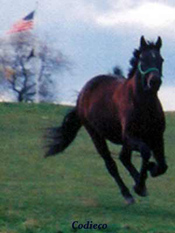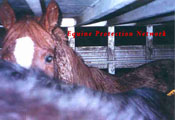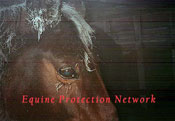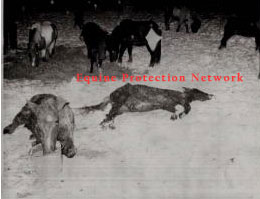
Join the EPN Announcement Only Mailing List
Shop for CD's at CDRush.com & the EPN Benefits!
Put "EPN" in the Coupon Code box when you place your order.
Now you can save money on your favorite music and help the horses at the same time!
EPN Website Sections
Press Stories 1980-2004
Caution Horses For Slaughter
by Heather Chapin-Fowler of the Corral Staff
The Final Roundup Pittsburgh Magazine 5 /2004
Fighting to Stop the Sale & Slaughter of US Horses in Foreign Countries - KDKA TV Investigates 4/30/2004
The Slaughter Question Horse & Rider 12/2002
State Ranks High in Equine Slaughter WTAE's Paul Van Osdol Reports 4/27/2001
Slaughterhouse Ride WISH TV News 8 I-Team Investigative Report 4/2001
Illinois Defeats Horse Slaughterhouse! 1999
Kill Sale Pittsburgh Post Gazette 6/ 1999
Horses To Slaughter
Police, vet check horses' health at New Holland sale
July 1998
PA Horse Transport Legislation - Act 64 of 2001
Horse Transport Bill Passes Unanimously WTAE's Paul Van Osdol Reports 6/21/2001
State Lawmakers Urged to Protect Horses en route to Slaughterhouses
June 1998
State Concerned with Cruelty to Horses Taken for Slaughter
'TRAIL OF TORTURE' ?
June 1998
Horse-Slaughter Industry Critics Pushing Changes
PA. Bill Would Help Protect Horses Headed to Slaughter
March 28, 1998
The goal is a humane trip for horses on the way to be killed for their meat, prized in Europe.
New York Does PA's Dirty Work January 1998
NYSP Stop Double Deck Trailer

Horses inside double deck cattle trailer stopped by the NYSP. The owner was later convicted & fined $3000.00.
Horse Popsicle Case 1994
Cruel Transport Results in $11,100 Fine

Horses inside double decker covered with frost.
The Last Ride
Eyewitness Account of trip to Slaughterhouse
Overcrowding, negligence plague Shelby horse feedlot
Great Falls Tribune 8/10/2003
The Torture Trail
December 1980
85 horses in trailer, 57 survive

A dead horse lies in the snow, while another too weak to rise eats from a bucket.
The Miracle Mile July 1990
Pregnant Mare Foals Hours After Rescue From Slaughterhouse-
Foal is a Stakes Winner!
 Pasturemate of the Stakes Winner, "On Route 66" who was born only hours after her dam was taken from a slaughterhouse
Pasturemate of the Stakes Winner, "On Route 66" who was born only hours after her dam was taken from a slaughterhouse
PA Dealer Sent to Prison 1999
Shady Horse Dealing
Renaissance Bob 12/ 1998
Rescue of a Racehorse
An Eye For An Eye
Story of Catch-22

Links
California Voters "Just Say Neigh" to Horse Slaughter!
HoofPAC
Shop online at IGive.com with over 600 great stores you know & love- including Back In the Saddle! Up to 26% of the purchase price is donated to the EPN!
The EPN gets $5 extra the first time you shop!
PayPal accepts credit cards! Please send your tax deductible donation to the:Equine Protection Network, Inc.,
P. O. Box 232, Friedensburg, PA, 17933.
HoofPAC is the political action committee that has been formed to end the slaughter of America's horses. Cathleen Doyle, founder of HoofPAC, led the successful Save The Horses campaign in 1998 that made the slaughter of California's horses a felony.
By Robert Moran
INQUIRER HARRISBURG BUREAU
March 22, 1998

PA Bill Would Help Protect Horses Headed to Slaughter
The goal is a humane trip for horses on the way to be killed for their meat, prized in Europe.
NEW HOLLAND, Pa. -- They are paraded through the auction ring at New Holland Sales Stables in Lancaster County: Amish buggy horses, racing thoroughbreds, petting-zoo ponies.
The ones that can ride or work fetch a decent price.
The rest, young and old, go to the "killers." That's what horse people call the slaughterhouses.
The doomed animals are loaded onto trailers, sometimes double-deckers -- "torture trailers," critics call them, because the low ceilings and slick floors are designed for cattle and hogs, not equines.
Then the horses endure journeys hundreds of miles long to meet their fate: a bolt through the skull at slaughterhouses in Canada, Texas or the Midwest, before their meat is shipped overseas for dinner tables in Europe.
Now, critics want to pass a law in Pennsylvania -- not to ban the slaughter, but to take the same steps New York and other states have taken: to protect horses from suffering on their last ride.
A bill now pending in the state House of Representatives would regulate the transporting of horses -- and outlaw hauling them in trailers built for smaller animals.
A typical double-decker trailer can have as little as 5 feet, 7 inches of space from floor to ceiling.
A typical thoroughbred, standing upright, is well over 6 feet tall.
The bill's supporters, including some of the farms that breed horses, say open-air, two-tier trailers have caused broken legs, eye gouges, head gashes and trampling. They point to years of news stories about dead and injured horses found in trailers, and to a 1994 case in which New York authorities found frost-covered horses with open wounds inside a double-decker trailer in minus-35-degree temperatures.
Debra Whitson, the Essex County prosecutor who handled the case, said the animals looked like "horse popsicles."
New York and other states already have a law.
"Our neighbors to the north have passed this legislation in an effort to stop what they refer to as 'torture trailers' from coming through their states,"
says Christine Berry, a Schuylkill County woman who is trying to rally support for changing Pennsylvania's law.
"Sit under your desk and you will have some idea what it is like to be forced into a vehicle that is too small and was designed for animals much shorter than you,"
says Berry, who worked for years at a horse-transport company.
"And remember: no water, no food, no rest. And imagine other people crowded in with you pushing and shoving for their space also."
The bill she supports would limit horse transport to one level of a vehicle and require room for a horse to stand upright. Trailers would need anti-skid flooring and ramps designed for horses. The bill would require rest and water for horses traveling longer than 12 hours.
Horses bound for slaughter would need to be inspected by a veterinarian to determine if they are fit for shipment. Mares nursing foals, mares late in pregnancy and foals under six months or 600 pounds could not be shipped to slaughter. Violations of the law would be misdemeanors.
The bill's foes in the farm industry -- Pennyslvania's largest -- say it would be costly and hard to enforce. They say existing anti-cruelty laws suffice.
The chairman of the House Judiciary Committee, Rep. Thomas Gannon (R., Delaware County), says a hearing on the measure, HB2127, could be held as early as May.
Though almost unheard-of in the United States, horse meat has been eaten for centuries in France, Belgium, Japan and elsewhere. Much of the horse meat served in Europe comes from here.
U.S. Department of Agriculture statistics show that 113,499 horses were slaughtered in the United States in 1996 for human consumption. The USDA had no figure for how many are shipped out of the country for slaughter.
Oliver Kemseke, vice president of Dallas Crown Inc., said his Texas plant takes in 300 to 400 horses a week, including loads from Pennsylvania about every two weeks. "We buy the end-of-career horses," said Kemseke. "The leftovers."
Kemseke, who is from Belgium, said slaughterhouses pay about 45 cents a pound for horses and the meat sells in Europe for about 60 cents or more -- with the best cuts getting as much as $6 a pound. North American horses make up as much as a fourth of the European market, he said.
In California, an initiative to outlaw the sale and killing of horses for human consumption is slated for the November ballot. California would be the first state with such a ban.
No such effort is under way in Pennsylvania. Supporters of the horse-transport bill say they have set their sights on an attainable goal, even if they revile the idea of horses being slaughtered.
"In Pennsylvania," says Berry, "it is realistic to make the last ride more humane."
Rep. Jim Lynch (R., Warren) is sponsoring the horse-transport bill. He has bipartisan support from 20 cosponsors and has received hundreds of letters of support. In five years as a lawmaker, he says,
"I have had more correspondence on this bill than all the other ones combined."
Lynch, whose district is in northwestern Pennsylvania, doesn't own a horse. But he is a devout Christian, and the issue touched a chord. "It says in the Old Testament that we are given domain over the animals," he says, "but it doesn't mean we can go out and abuse them."
Rep. Raymond Bunt Jr. (R., Montgomery), who chairs the House Agriculture and Rural Affairs Committee, has some reservations. Bunt says farming interests have told him a new law would be costly and hard to enforce.
Mel Eckhaus of the Pennsylvania Farm Bureau, a farm-industry trade group, said the state's existing cruelty statute -- which makes it a summary offense to transport "any animal in a cruel or inhumane manner" -- is enough.
"We're questioning the necessity of having to have new regulations."
Spporters of the Lynch bill say Pennsylvania's cruelty law isn't being enforced and a new law is needed to focus attention to horse transportation.
One of the most outspoken supporters, Berry, sends material to a Web site dedicated to passage of the bill.
"This legislation is not precedent-setting,"
Berry said. "New York put their transport law on the books 17 years ago."
She mentioned six other states with transport laws. he New Holland horse auction is one of the busiest in the eastern United States. Every Monday, an average of 300 horses are sold. The "killer buyers," as the slaughterhouse agents are known, account for a quarter to a half of the sales, according to people who work there or attend the auction regularly.
Norman Kolb, co-owner of the auction, declined to comment.
John Muldoon, a horse trainer from Chester Springs, attends the auction twice a month looking for bargains. He figures half of the horses there go to slaughter. For some horses, he said, "there's no other alternative."
Several buyers who are regulars at New Holland have run afoul of the law -- in New York state.
On Feb. 23, Arlow Kiehl attended the horse auction at New Holland. His double-decker was outside, awaiting a cargo destined first for his farm in Watertown, N.Y., then to the slaughterhouse.
That night, Kiehl's truck traveled up Interstate 81. He and the truck's driver were stopped about 50 miles north of the Pennsylvania line by New York state police.
Kiehl was charged with violating the state law governing horse transport. He was hauling 22 horses. Kiehl has pleaded not guilty.
In an interview, Kiehl said he ships horses to a Belgian-owned slaughterhouse in Ontario -- and that he treats them humanely. He acknowledged not having a Pennsylvania license to buy and haul horses, but he said he is licensed in New York and federally.
The 1994 "horse popsicles" case resulted in an $11,100 fine against David Carper, a New Jersey hauler who works for his father, Frank Carper. Both Carpers attend the New Holland auction. Frank Carper said of the case against his son:
"I'm not paying some outrageous fine because some judge has [ a bias against ] someone hauling slaughter horses."
He says he wants to settle the case.
Horses bound for slaughter are a familiar sight to New York authorities. Last October, they stopped a load of 32 horses being hauled by one of the companies that buy at the New Holland auction. And in January, New York State Trooper Stephen Cornell arrested the driver of a two-tier trailer heading up Interstate 81. Inside the trailer: 30 horses from New Holland.
Cornell says New York authorities catch no more than 5 percent of illegal loads of horses. Pennsylvania law, he said, is "definitely in need of some changes."
Save America's Horses!
Please send your tax deductible donation to:
Equine Protection Network, Inc., P. O. Box 232, Friedensburg, PA, 17933The official registration and financial information of the Equine Protection Network, Inc., may be obtained from the PA Department of State by calling toll free within PA, 1-800-732-0999. Registration does not imply endorsement.

